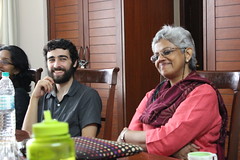By Joshua “Yoshi” Fields
The Timbaktu Collective is one of those places that when you walk into, you can feel the energy change, you can feel the connection, not only to other people but also to the environment as a whole. It was especially striking coming from the city where so often children pull at my sleeves with a pained face, begging for money. It was a contrast even to our experience on the train to the Collective. On the train we sat next to a young woman whom, despite her age, seemed beaten down with years of struggle as she quietly handed her four children a folded chapati to nibble on the train. Here, at Timbaktu, I was met by smiles and the sounds of laughter. “Uncle, uncle” the kids would call to me as they ran around, climbing the Jungle gym without hands and sliding down the slide. “Super?” they ask, “Super” I say, their energy and smiles contagious.  I had stepped into a place where people had a shared responsibility for the kids, where the food eaten was a conscious decision and people shared a goal and practice of sustainability. What creates a place of such inner beauty?
I had stepped into a place where people had a shared responsibility for the kids, where the food eaten was a conscious decision and people shared a goal and practice of sustainability. What creates a place of such inner beauty?
The Timbuktu Collective is a triple bottom line organization, meaning that it addresses social, environmental and financial issues. This is also referred to as the 3Ps, profits, people and the planet. When visiting the Collective, I was especially drawn to one way that the Collective are addressing the environmental and social issues and how the two are linked together.
About 70 years ago the Indian government subsidized peanuts and provided fertilizer and pesticides to the farmers. Farmers stopped using the ancient practices of the area and focused on peanuts, which lead to mono cropping and destructive farming techniques. This quickly had a devastating effect on an already rain deprived region and left the farmers with infertile land and without a source of income. The Timbuktu Collective is addressing these issues with both a social and environmentally sustainable focus.
One of the many components of the Timbuktu Collective is an organic farm co-op. Within the Co-op, the practices being used as well as the plants grown stem primarily from the elders of the area. Pulses, which include red gram, green gram, cowpea among others and millets grow well with the limited rainfall of the area and these were the primary foods grown before the government intervention of peanut subsidies. The co-op currently is growing 28 varieties of rice, 31 varieties of millets, 18 varieties of pulses and 7 varieties of oil seeds. These foods are very healthy and the cooperative stresses the need for the farmers to eat the food they grow, an idea that was largely lost from years of mono cropping.
The co-op is focusing primarily on the social and environmentally sustainable parts of the triple bottom line. Today, the land is once again becoming green and increasingly fertile. The farmers have income, a strong connection to the area’s vibrant culture and a sustainable relationship with the land. While the social, and environmental aspects are bringing strong results, for the co-op, profit has been a struggle. This is the first year that the co-op itself has broken even. However, the individual farmers have been making a profit every year.
“Live simply so that others may simply live” a quote from Gandhi which was on one of the signs in Timbaktu. This simple life that this community is living is one of the most vibrant communities I have had the pleasure to step into. I think that this is greatly due to the triple bottom line approach. From what I have learned and saw on my visit, this holistic focus has created an oasis where the focus is on giving the villagers a stronger livelihood through building from the rich culture of the elders, working with the land instead of manipulating it and bringing local foods back to the community.





